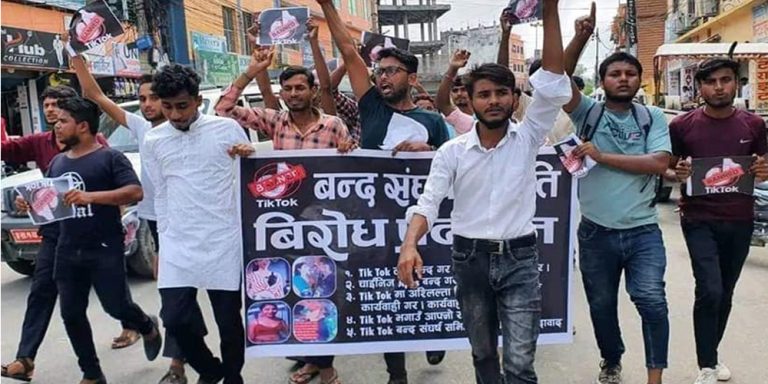
Youth in Madhes Province have launched a movement to impose a ban on TikTok citing that the social networking site has led to increasing disorders in society.
The youth have sent a memorandum to the Office of the Prime Minister and the Council of Ministers through the District Administration Offices of the Province demanding that TikTok be completely banned.
The anti-TikTok campaign that began in the Mahottari district has now spread to other districts of the province. The youth irked by the misuse of the social site has already submitted a such memorandum to the Prime Minister through the heads of DAO offices and security agencies in Mahottari, Dhanusha, Siraha, Saptari, and Rautahat districts.
The local youth of the concerned district led the campaign and submitted the memorandum to the local administration. They claim that the posting of suggestive activities is increasing on TikTok.
Locals have staged demonstrations in Dhanusha and Siraha chanting slogans like ‘TikTok should be stopped, TikTokers making obscene videos should be punished and TikTok should be discarded and everyone should engage in preserving the culture.
Abhijit Das of Mahottari said that they launched a campaign to stop TikTok after its users started making fun of religion in religious sites. He claimed that in the hope of getting more viewers, likes, and comments in a short time, girls have been posting their dances promoting obscenity with music from different Bhojpuri and Hindi songs.
According to Shambhu Pandit of Dhanusha, this app should be banned in Nepal as in India, as teenagers and children, who are considered the pillars of the country, are getting addicted to TikTok and ruining their future.
He argued that unpalatable activities are increasing in the name of TikTok despite the fact that contents against morality, spreading hatred towards anyone, spoiling relations among the followers of different religions, and creating confusion among people are banned according to Sub-section 1 of Section 47 of the Electronic Transactions Act 2006.
Source : TRN,






